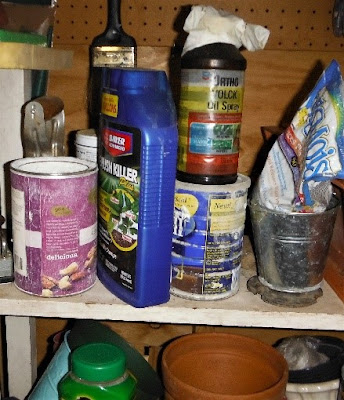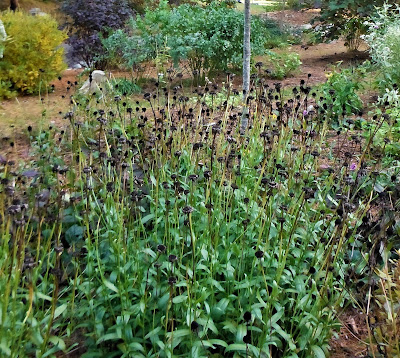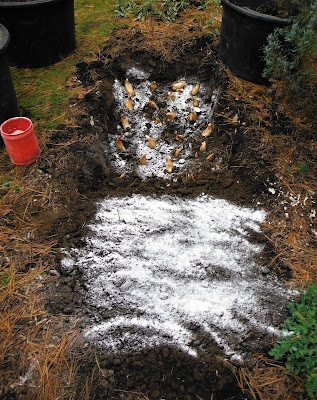Note any old packages of herbicides and pesticides. Heat, cold and age all reduce the effectiveness of many of these products, but not their toxicity to the environment. Put them aside to dispose of at special collections centers or toxic material days held locally. NEVER place them in the trash or pour them down the drain or out on the ground. The environment you save is the one you and your family live, garden and play in.
Wednesday, December 30, 2020
Wednesday, December 23, 2020
Winterize Your Tools
Outdoor gardening season is over, so now it’s important to clean and organize your gardening equipment. Send your mower in for service (you won’t care if it’s not ready for three months). Wash the dirt off shovels, rakes and trowels. Then remove any rust with a piece of steel wool. Finish with by rubbing on a light coating of oil on all metal parts. Clean and sharpen edges pruners, loppers and other cutting tools. In the spring you’ll be glad you are ready to start gardening with like-new tools.
Wednesday, December 16, 2020
Don’t Wait to Order Seeds
Last spring, seed companies found themselves overwhelmed by orders from people wanting to start vegetable gardens amid pandemic shutdowns and shelter-in-place orders. Anyone who waited to order found not just their favorite seed varieties sold out, but also second- and third choices. Despite assurances they were increasing orders from their suppliers, a quick check in late November showed many favorite seed varieties are ‘not available at this time’. Don’t wait until the new year to put in your order; do it now.
Wednesday, December 9, 2020
Protect Your Shrubs
Any plant that regularly fails to thrive after a tough winter needs extra protection. You can use many of the same techniques that work for roses, for spring flowering hydrangeas that fail to bloom, as well as not-quite-hardy shrubs. Plants can be protected with wind screens, or cages stuffed with straw or leaves. Plants susceptible to branch break from heavy snow need special help. Tying branches together with heavy twine can be effective. For small plants, slatted structures allow good air flow while preventing crushing snow loads from building up.
Wednesday, December 2, 2020
Decorating
Pruning evergreens now has a second benefit. You can use the cuttings to make holiday arrangements! Cuttings from spruce, cedar, pine and fir make great decorations on their own and elegant arrangements especially when combined with flowers for special occasions. Conversely, don’t bother bringing in hemlock; it sheds its needles almost immediately. Similarly, holly must be kept in clean water and will still have a short life span. Leave the winter berries for the birds that need them for food. They fall off and can a danger to small children or pets who find them on the floor.
Wednesday, November 25, 2020
Are Your Houseplants Winter Ready?
With your home’s heating system now running full time, your house plants will need more water to compensate for much lower indoor humidity. Check them frequently for dry soil. They will also appreciate regular mistings.
Wednesday, November 18, 2020
Decorating for the Holidays?
If you plan to put lights on outdoor trees or shrubs, do it now. Why? Because the branches become more prone to breaking as the weather turns colder. After the holidays, leave the lights in place until you have a warm day when you won’t risk damaging branches when you remove the strands.
Wednesday, November 11, 2020
Thanksgiving Centerpieces
When you cut greens for indoor or outdoor displays, remember those basic rules for pruning so you do not accidentally transform a handsome tree or shrub into a landscape liability. If you like bright, berry accents among your greens, use artificial ones instead of taking berries from the birds.
Wednesday, November 4, 2020
Compost!
Leaves and other clean foliage should go into your composter or compost heap. Leaves run over by the lawnmower are a great source of nutrients for new plantings and existing lawns. Spread mulched leaves over old garden beds. The leaves’ nutrients will move toward the roots from the freezing and thawing action of the soil.
Wednesday, October 28, 2020
Cleaning up the Perennial Bed Doesn’t Mean Cutting to the Ground
The traditional advice for cleaning up your perennial garden in October was to cut everything to the ground. Science – and common sense based on observation – says that practice took away a valuable food source for both migrating and over-wintering birds. Instead, leave up the flower stalks with seed heads birds. Migrating birds appreciate the food. And it is vital for those species that over-winter in New England. In addition to less work for you, the birds make your garden a more interesting place throughout the winter. The ‘no-cut’ policy isn’t universal, though. Always vigorously clean up any plant that has battled disease this year. Again, you’ll save yourself work and enjoy your garden more in the spring.
Thursday, October 22, 2020
Remove Potatoes Before There’s a Hard Frost
Dig them out carefully and then brush off soil, but do not wash them before storing. And keep them out of the light. Potatoes do best if allowed to cure for a couple of weeks in a cool, dark place. Place newspapers under them while the skin hardens. Do not try to store any that have nicks or bruises; instead, use them immediately.
Wednesday, October 14, 2020
Bulbs
Your tulips should be in the ground now, and small bulbs such as crocus, snowdrops, and grape hyacinth should be going into the ground by mid-month. Hold off planting daffodils until later in the month. To keep squirrels and other varmints from digging up and eating your bulbs, dust them with lime as you put them into the ground, and then add a layer of lime on top of the planted area. The lime interferes with smelling the bulbs, and is an important in ‘sweetening’ the soil for these plants that come from a part of the world with much less acidic soil. If you have very aggressive rodents, add hot pepper or chili powder to bulb coating.
Wednesday, October 7, 2020
Don’t Count on Rainy Weather
New England is going into the autumn with a rain deficit of as much as nine inches in some areas. The map tells the story – and the contrast with last year when we were only ‘abnormally dry’. What to do? If your soil feels dry down several inches, water any trees and shrubs that will need the water over the winter. So as not to waste water, set your hose up to slowly deliver the right amount (one to five gallons depending on the size of the plant) rather than spraying the entire garden. You can also use a bucket or other container to slowly deliver the right amount of water to the plant’s roots. As you take care of this immediate need, think critically about your plantings to see if you have any water hogs that could be replaced with less demanding plants next spring.














